Post-publication update by the author:
After the publication of the article, Malaysiakini has contacted me to clarify two issues which I had wrongly stated. Firstly, Ibrahim Ali was seen to be handing out white ang pows since the beginning (justified by reporters from two news agencies who attended the Open House). Secondly, the “deleted” comment criticising Malaysiakini’s journalistic standard was never deleted [see Note 4; Malaysiakini has published three feeds in regards to the same video, the comment only appeared on the first feed (not the second or third feeds) while the commentator believed that there was only a single feed].
These mistakes are mine alone. I must therefore apologise to remain loyal to the politics of gifting: on the first, for being a product of the mainstream media; on the second, for accusing Malaysiakini of censorship. This apology will not diminish the critique but serve as a reminder to our own myopia.
Tan Zi Hao, 9 February 2012.
Amidst Ibrahim Ali’s white-ang-pow–controversy, the recipients involved are dragged into our gaze: they are the elderly – Perkasa’s perfect assets, Malaysiakini’s perfect victims. This article seeks to explore the problematic gift, to draw lessons from this political spectacle, and to explain why Ibrahim Ali must be forgiven even before an apology is made.
Again, we are consumed by the politics of colour – previously by a paradoxical yellow, a colour representing dirty, cheap sensational journalism notwithstanding, which became associated with an opposite bersih or cleanliness; and now, by the red of the ang pow (red packet), by no means lacking in substance, which is a messenger of greetings and a container of currency notes. And it is through this packet where Ibrahim Ali has had his misfit, intentional or accidental; he handed out white instead of red packets to Chinese attendees [1] at his very own Chinese New Year Open House, thus igniting a public outcry, an addition to his handsome portfolio of controversy.
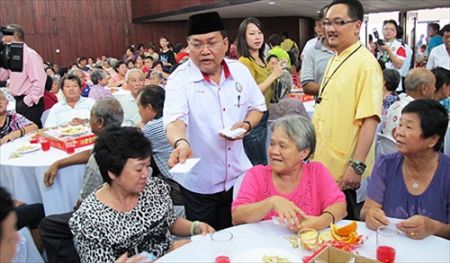
I believe controversy like this is not trivial but of great concern to the Malaysian public because it occasioned public response, a door to the understanding of the socio-cultural aspect of being ‘Malaysian’ (a national political frame). I also believe that Malaysia as a political entity plays the politics of culture, and if any substantial change occurs, it occurs through cultural instruments [2] if not through the political system. After all, we are witnessing an epoch of soft power. And when an ang pow could strike such a chord with the Malaysian public, the packet must possess the soft power not to be underestimated. Let us now examine this ‘power’.
Ang pow is short-lived. You receive an ang pow, you take the money, you put the packet aside. You like what lies inside than what appears outside. But the appearance is important to conceal what is contained – the money. Perhaps, the monetary gift is stark materialism, too crude in itself and therefore requires an orthodox cover to obscure its lure. Then, the ang pow becomes almost valueless at post-reception: it is only secretive and decorative, but once the secret (the monetary value) is revealed, the packet is left aside to be disposed of. It is therefore wasteful, but necessary.
The ang pow is also an agent of greetings. If the currency note is received in its naked form, it becomes purely financial and transactional. On the other hand, if it is clothed in customary red, it becomes a greeting and bears an ephemeral value beyond its transactional quality. In the Open House, however, Ibrahim Ali claimed to have run out of ang pow and began to hand out money in white packets, and later, ‘in the nude’.
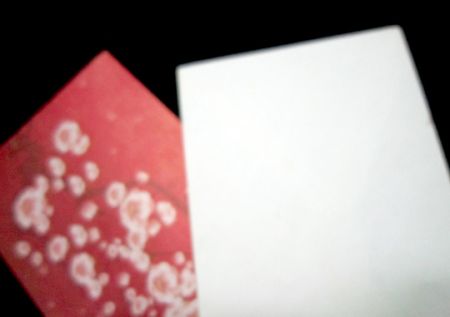
His action appeared disrespectful to some. The white packet seemed inauspicious, while the money without an orthodox cover seemed like an open public bribery. However, the criticism of Perkasa is just as ‘disrespectful’. I will explain why in the following section. The article will focus on two apparent opposites – actually politically identical – one of Perkasa, the other of Malaysiakini observed through an interview [3]. Anyhow, readers should bear in mind that they are mere convenient subjects of critique. Eventually, this event should come to shed light on our own myopia, a short-sightedness not exclusive to them. Readers should also recognise both organisations as social constructs of our political reality to which we are held liable.
To begin, one must look at the intention of the organiser and the attendees: the organiser wished to gain political mileage before the election and the attendees wished to bring home money along with satisfied stomachs. Unfortunately, the organiser’s intention backfired. And since good intentions usually do not justify their ends if expressed haphazardly, Perkasa has indeed erred due to its insensitivity.
However, the kind of reproach targeted at Perkasa is worthy of scrutiny. One can identify an interesting ploy: despite the criticism of Perkasa, the attendees – mostly the elderly – were not left unscathed. They were objectified and appropriated in the criticism to give the critics the license to be more punitive towards Perkasa. The critics victimised the elders to make them their political instruments.
The elders who received the money uncritically were also held liable for being a disgrace to the ethnic ‘Chinese’. Their argument is that they should have rejected the money (those not packed as ang pow) to retain self-respect. This is of course an ambiguous argument: what is self-respect when one is directed to commit an action against the will? I shall hold this point in abeyance because I must now provide some examples from Malaysiakini’s interview, with some comments extrapolated from the site, which will demonstrate the points I wish to argue.
In the beginning of the interview, the interviewer (MK) asks the interviewees (A and B) for general opinions. This is then followed by a bombardment of MK’s opinions, before MK poses other questions that seek to reinstate MK’s presumption of Perkasa. Below are selected excerpts translated from the interview on video:
[youtube]SbGGF8lU2X8[/youtube]
Excerpt 1 [3:11 – 3:16]
MK: How did they (the organiser) persuade you to come? By saying that there is something to eat here and ang pows to be handed out?
To use ‘persuade’ instead of ‘invite’ demonstrates MK’s scepticism – the elders are (already) powerless and gullible.
Excerpt 2 [3:26 – 3:51]
MK: Do you know Perkasa? Perkasa, Pertubuhan Pribumi Perkasa Malaysia. Do you know what is Perkasa?
A: No.
MK: Perkasa is that organisation, it is highly racialised. Do you know that they have said something that have hurt the Chinese…hurt the heart of the Chinese? Do you know?
A: No.
MK: Do you read about them on news? Do you know the organisation’s Ibrahim Ali?
Here, MK seems to be on a mission to inform A about Perkasa, but with information that is limited and within MK’s preferred perspective. MK’s introduction of Perkasa is composed only of negative comments about the organisation. After an interruption (another individual handing out plain, unpacked money [RM10 note]), MK continues:
Excerpt 3 [4:08 – 4:20]
MK: You didn’t get it (the money) earlier?
A: I got it, I got it.
MK: You got the white packet.
A: Yes, yes.
MK: White is not auspicious.
A: Oh.
MK: You don’t mind?
A: They gave ang pow… (inaudible)
“White is not auspicious” is emphasised, as demonstrated with the suffix at the end, “wor” (not transcribed). Again, even if white is perceived as inauspicious, it should be coming from A and not MK. This demonstrates MK’s attempt to influence A. However, without getting any response, MK continues with the close-ended question, “You don’t mind?”. This necessitates a precondition that A has agreed to MK’s “…white is not auspicious”. MK then asks for personal names. And just when you think this is over, MK poses the same questions to A (and B) again:
Excerpt 4 [4:55 – 5:33]
MK: You come here because of the ang pow? You heard there will be ang pow?
A: They asked us to come here to receive ang pow, that’s why we come.
MK: Oh.
B: The old folks, of course. They are happy.
MK: Are you all happy?
A: Yes.
MK: And there’s something to eat?
A: There’s something to eat and there’s ang pow, so we come.
MK: Oh, they didn’t tell you that it is organised by Perkasa?
A: I don’t know.
MK: If you know that Perkasa always hurts the feelings of the Chinese, will you come?
A: (pause) We are all Chinese, we are all the same.
MK: So let’s say if this organisation…
A: (Interrupts) We don’t know much about this.
MK: So you don’t know?
A: Yes.
MK knows that A and B are unaware of Perkasa but has not given up. Then, it appears MK intended to provoke them by posing the if questions, but it fails since neither A nor B has any clue about Perkasa (other than the information provided by MK). At this point of time, A and B seem reluctant to respond, perhaps disheartened upon knowing about the MK-version-Perkasa, and with a sense of guilt, felt embarrassed. Or perhaps, they are simply impatient (notice their expressions and the short pause before A responds). Undeniably, MK as a practising journalist, has an agenda at odds with journalism ethics. Later, MK proceeds with another person to pose similar questions.
While alternative media such as Malaysiakini has emerged from the rising distrust of mainstream media, here’s what’s fearful about this sort of alternative avenue: upon given allowance, objectivity can be easily abused as shown in the interview and the interpretations of it by commentators [4]. This is the ‘alternative’ advantage – exotic and innocent – and Malaysiakini has bypassed our critical faculty to become a new agent provocateur. A new brand with renewed content, yet a mere duplicate of previous media politics we have come to despise.
Hitherto, Perkasa and Malaysiakini, being all too conscious about their roles and conditions, have relentlessly sought opportune loopholes in the objectified elders. For Perkasa, the elderly being unaware of their past controversies was an advantage. For Malaysiakini, the lack of awareness in the elderly was newsworthy since it exemplified Perkasa’s attempt to buy over a few ‘Chinese’. It then attempted to provoke the elderly by speaking ill of Perkasa, to instill a sense of guilt in them. If we examine the interviewer’s gaze, we can conclude it is provocative, chauvinistic (the emphasis on ‘Chinese-ness’) and oppressive (the assumed gullibility of the elderly). I do not see any difference between this gaze and that of Perkasa.
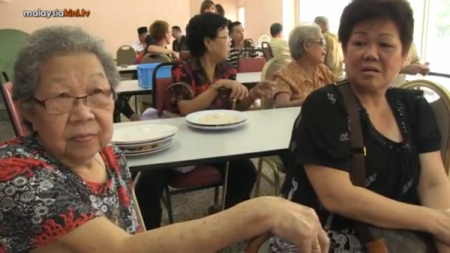
Despite their opposite agendas, Perkasa and Malaysiakini share the same violence in their ‘gaze’, the way they scrutinise affairs. Limited and myopic, such a way of looking at things has kept (and continue to keep) Malaysians distant from opportunities of learning from one another.
The Malaysian public is witnessing a mediated spectacle through these ‘violent gazes’: the elderly became an easy prey – an instrument for Perkasa to garner non-Bumiputra acceptance, and for Malaysiakini to provoke the viewing public. The elders were entrapped within a political fissure; they did not know about Perkasa or Malaysiakini’s claim that Perkasa is ‘racialised’. They are simply ‘stupid’ [5] and ‘ignorant’ [6], Perkasa’s perfect assets and Malaysiakini’s perfect victims.
It is a ‘shame’ [7], some have claimed, to watch the elderly receiving the money mindlessly; shame, too, that the regret is expressed without first understanding the power-relation and participants’ respective political capital taking place in the event. Perkasa was highly aware of their intention, as for the elders – as recipients of ang pow (and food) – they were only unaware of the kind of politics that have come to preoccupy some of us. They should not be castigated for being ‘ignorant’ (here, only presupposed) due to the fact that they do not play the language game some of us do.
Postscript: Politics of Gifting
We must now return to the ang pow, to take inspiration from the politics of gifting, and there is a lot to learn from this form of politics. The reciprocal aspect hinted within the red cultural vector provides a pertinent lesson to our political culture. The giving and receiving of ang pow is itself a form of social exchange, whereby the packet serves as a symbolic bond allowing the givers and the receivers to associate themselves in a common reciprocal platform.
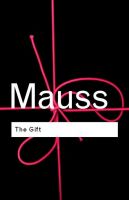
In the politics of gifting, Perkasa was attempting to purchase acceptance through the dispensing of ang pows. In return, the attendees were expected to materialise Perkasa’s unstated aim. However, whether such an exchange was and will be successful and mutually beneficial, must be left to the discretion of the participants involved within the exchange – yes, the discretion is their dignity. And speaking of ‘self-respect’ – what we have witnessed for the past few days have instead been individual critics exterior to this manufactured relationship, being intrusive or ‘disrespectful’, and who have demeaned the politics of gifting by disallowing potential exchange.
Of course, acceptance is not easily bought but earned. One may doubt if Perkasa’s Open House will achieve its aim. But at least, under political pressure, there is the beginning of diplomacy from the perceived ‘extremist’. And this is how the balance of power can be played – through directed political pressure, we can garner positive energy to march towards political maturity [8].
Another important lesson from the politics of gifting lies in reciprocity and humility. One who first gives will first receive (read: the one who first greets will first receive the ang pow; the one who first gives the ang pow will first receive the greetings); and the one without ego will first give, and thus will first receive. A gift is therefore ‘anti-ego’.
Even though Ibrahim Ali refused to apologise, the critics must forgive him because forgiveness is a gift – remember, those who first give will first receive. This is soft power in practice: forgiveness as a symbolic power. And if such ‘politics of gifting’ could be inculcated in our political culture, the ang pow – red or white – would be worth more than what is contained.
Notes:
- ‘Chinese’ is one problematic word that I do not wish to further problematise in this short article. I will leave it to the readers to assume to whom it refers in the context of the event, and I will avoid using the term ‘Chinese’ in any case possible, for I do not intend to sound chauvinistic and ethnocentric – both impressions of which will restrict my voice.
- Examples of cultural instruments: the symbolic (‘Negarakuku’, Najib’s flag, PPSMI, Bersih 2.0), the consumerist (Kedai Rakyat 1Malaysia, one-off subsidies), the festive (the Yu Sheng debate’, Najib worship in Batu Caves, banned Hari Raya and Christmas commercials), the mythic (stereotypes, the lazy natives) the colourful (Bersih 2.0, skin colour, Jalur Gemilang) etc.
- Ibrahim Ali dishes out RM10,000 in white ‘angpow’, Malaysiakini.tv, January 29, 2012, accessed February 01, 2012.
- Refer to Malaysiakini.tv, ibid., for readers’ comments. According to the CEO of Malaysiakini, Premesh Chandran, all comments on Malaysiakini are monitored (quoted in a forum with Anil Netto and Zaharom Nain, organised by the University of Nottingham, 22 October 2011). A friend of mine posted a comment on the prejudice of the interviewer but his comment was deleted. I have no issue with the monitoring of comments, but censoring criticism on news reporting has led me to doubt the credibility of Malaysiakini.
- From a commentator on Malaysiakini.tv, ibid.: “Stupid old untie and uncle…..”
- From another commentator on Malaysiakini.tv, ibid.: “Really not respect our chinese custom! feel hot … and kasihan to those untie and uncle who r ignorance.”
- From yet another commentator on Malaysiakini.tv, ibid.: “Shame…just RM10 … make fun by the racist, it is very clear the dam Ibrahim Ali is making fun on chinese, should not attend the function, nw hadap for RM10 but complaints, shame on ourselves.”
- I am not supportive of Perkasa, but one must respect the language game. We can assume that all politicians are party-centric, and to achieve maximum social welfare in governance, political pressure must be channelled appropriately (power management) through various cultural instruments. We can be sceptical of Perkasa, but not the power of negotiation (diplomacy). Many are too quick to discredit Perkasa, today’s punching bag; such reaction is uncritical, revengeful and will not foster a healthy polity (even with the absence of Perkasa).

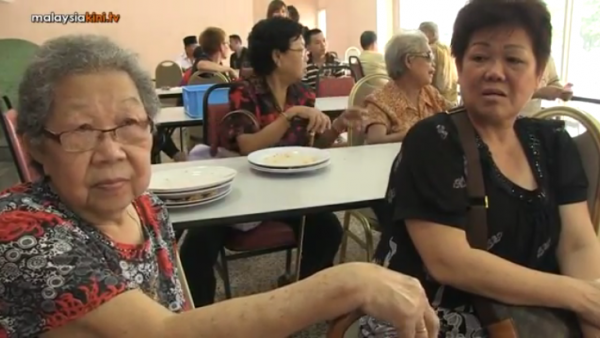
Congratulations on a post well done. I'd like to point out something though: in every nation, the media plays a role in advancing political views, in the US, Fox News, TIME, and the like are biased in their own way. Malaysiakini and Utusan play these same roles of juxtaposing different viewpoints, and I think rather than condemning this, it should be something to cherish. In fact, people should be aware of these very viewpoints, and thus decide for themsleves who to believe- that is what we call the fourth state- the media.
Sorry dude, we in Bolehland here just don't have time for discernment lah. We still have people like Anonymous Coward who are off on a journey to discover the definition of "justice". The only "state" we know is the rubber eSTATE!
We are all waiting for the 2nd coming of the PERFECT newspaper that will tell the whole truth and nothing but the truth. Only then we will know the real truth. And it must be a broadsheet – better for lining the bottom of the garbage bin.
Tan Zi Hao are you saying that the money in the packet is more important than the colour of the packet?
Afterall thats why the folks are there for. They cant be going home empty handed after being promised of getting something. Even if the colour matters, what can they do at that point? Make a fuss of it infront of the media and crowd? There's no way I would do that if I were them. Would you?
Of course MyCulture, you can have the envelop, whatever its color.Just give me the money.
Like the BR1M letter which arrived in an envelop headed URUSAN SERI PADUKA BAGINDA. Inside was a letter from BN telling me to go collect from UMNO office. Isn't it an offence to slip things into an official letter? How come UMNO office is handling Govt voucher?? But who cares, man. I just took the money and ran. I'll raise the matter at the appropriate time – not with the makcik handing out the voucher.
You have time to write about Malaysiakini but nothing about UTUSAN, The Star and NST?
I am disappointed because you are indirectly attacking the freedom of media itself. What's wrong with reporter asking tough questions? Your article is not helping anyone at all for making a better Malaysia.
'Tough' is different from 'leading' or 'biased'. This is why media studies is crucial – we need the skills to be able to process the 'information' we are receiving from the media all day long. Here, the writer has chosen MalaysiaKini as the case in point, but he also expressly says that it is merely an example:
"Anyhow, readers should bear in mind that they are mere convenient subjects of critique."
The fact that he is not criticizing other media outfits in THIS article does not mean that he is entirely uncritical of them. But perhaps we can find a clue to his intentions in his description of himself:
"[Tan Zi Hao] looks for issues where the public and himself have overlooked."
After all, since Utusan, The Star and NST have been (and continues to be) well criticized, what is the point of yet another writer also jumping on to the bandwagon?
So shall I write whole page of irrelevant post and state it's just an example? Writing something while not having a firm stand on the matter, 1-1 = 0
Ibrahim Ali merely disrespect, Old folks who ferry around by the MCA politicians are innocent because they don't speak the intellectual language, and Malaysiakini is as bad as Perkasa because the journalist ask tough question? Also based on your friends accusation you immediately accuse others of censorship ?
Can we simply absorb all the mistake and sin of the social vulnerable group because of they are inferior ? Then what is the morale between collaborators and occupier ? Tell that to the Palestinian.
How objective is your article ! How surreal than reality !
Also pls read Chinese press to get more accurate account of the event: From start it was only white pow and the old folks where disappointed as there are no hampers as promised, so the Perkasa leaders ditch out money. The former MCA leaders who brought the old folks there also confirm that everything including the decoration of greeting on the wall is white. So white ang pow was not an accident.
Next time please do more homework, verify and give people write to reply before you judge others with presumptions. Holier than thou attitude only give rise to self-righteous !
If the whole issue is reversed & PR is doing it what do you think Utusan/MCA will do, better or worst than MK? I hope to read your write up on utusan or any of the government controlled MSM reporting.
Good analysis. However, the writer may have junped to the conclusion of Malaysiakini's "violent journalism" based on the very poor, crass, biased and obviously unprofessional MK journos in the above interview.
MK per se is not biased per se, (though more often than not, often it may find itself leaning towards the side of justice), and putting it on the same pedestal as "Shit! Shit! Shit"-Perkasa is missing the wood for the trees.
Professionalism, language skills and good command of English is sorely lacking in the media today , (mainstream or otherwise), just as in many other fields.
So refreshing to see a well articulated piece. Keep it up Tan!
> though more often than not, often it may find itself leaning towards the side of justice
Justice? By whose definition?
Anonymous Coward,in case you don't already know, for human beings, justice, love, peace, patience, goodness etc, does not need defining. Either you have it or you don't.
But I'm sure you know that already.
A long written article but seems too' literally bombarstic' at times to comprehend. Anyhow,I just want to comment on the giving of 'angpow' which is traditionally a chinese customs which means good omen for both the giver and the receiver but more so for the receiver. So,in this context,by giving white 'angpow'(which is considered as bad omen for the chinese),Ibrahim Ali has done very wrong.He defend himself by pleaing ignorance but come to think of him as a Member of Parliament,he should not have not known about this fact.
Anyhow,this open house is just a publicity stunt by PERKASA using the 'poor' elders as their participants.
Yup. A strict editor would have made it better.
Sad to see that so many of you writers and editors are trying to defend this racist organisation who adds zero value to unity of our races.A leading english newspaper even bluffed by saying that the white envelopes were used after red angpows were finished…in the first case no red angpows was used as seen in newspapers/video, even remorseful Mca Tiew said he did it on purpose.None of the elders knew why they were there for except got food and angpows,presents as told by someone.Now most chinese are highly suspecting Mca are partnering perkasa to scare the chinese back to voting them.
A critique on media and reporting does not equate to support or defense for Perkasa. Don't be sad.
Zi Hao, thank you for writing this critique on the alternative media. I hope more young people will develop an eye for this and will 'put pen to paper' as you have here. Clearly there is nothing "innocent" about the alternative, and I'm glad you called it by its real name – "agent provocateur".
Well done Zi Hao and very skillfully written and argued, point by point. MK sounds more like, "leading the witness' and the questions are double edged. I 2onder what is MK's motives?
A. Ali is wasting his time and money, he should instead use his money to travel round the world like the Talent Corp. to plea to the pendatang to return to serve Malaysia.
Also he should have persuaded the IGP to have his medical treatment in Malaysia instead of traveling to U.K., especially so at the expense of the Malaysian public, to have his medical treatment there. After all Malaysia must have the expertise with millions of NEP (Never Enough Policy) top Malay students are been sent abroad to become professionals. Where are these students after so many decades of this policy ?